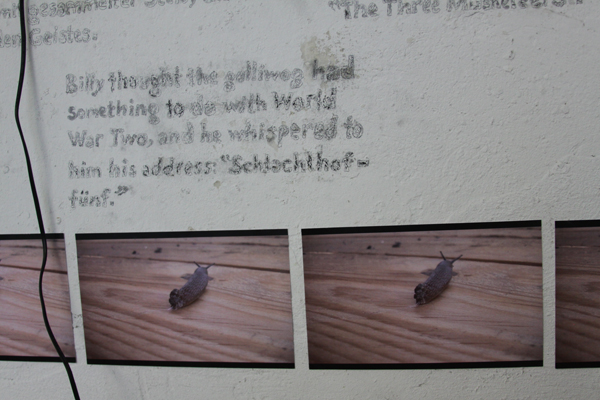Siddhartha Meets Billy and the Bugs And The Other Guys
22/07/2014
All this happened, more or less.
Birds were talking.
One bird said to Billy Pilgrim, “Poo-tee-weet?”
War es nicht dies, was heute endlich seinen Tod gefunden hatte, hier im Walde an diesem lieblichen Flusse? War es nicht dieses Todes wegen, dass er jetzt wie ein Kind war, so voll Vertrauen, so ohne Furcht, so voll Freude?
When a Tralfamadorian sees a corpse, all he thinks is that the dead person is in bad condition in that particular moment, but that the same person is just fine in plenty of other moments.
All time is all time. It does not change. It does not lend itself to warnings or explanations. It simply is. Take it moment by moment, and you will find that we are all, as I’ve said before, bugs in amber.
“Es ist gut”, dachte er, “alles selber zu kosten, was man zu wissen nötig hat. Dass Weltlust und Reichtum nicht vom Guten sind, habe ich schon als Kind gelernt. Gewusst habe ich es lange, erlebt habe ich erst jetzt.”
And Billy zoomed back in time to his infancy. He was a baby who had just been bathed by his mother.
Ihm schien, es habe der Fluss ihm etwas Besonderes zu sagen, etwas, das er noch nicht wisse, das noch auf ihn warte.
All moments, past, present, and future, always have existed, always will exist.
Mit tausend Augen blickte der Fluss ihn an, mit grünen, mit weissen, mit kristallnen, mit himmelblauen.
And the blue line met the red line and then the yellow line, and then the yellow line stopped because the character represented by the yellow line was dead. And so on.
The stills were more Tralfamadorian than the movies, since you could look at them whenever you wanted to, and they wouldn’t change.
“Nicht wahr, o Freund, der Fluss hat so viele Stimmen, sehr viele Stimmen? Hat er nicht die Stimme eines Königs, und eines Kriegers, und eines Stieres, und eines Nachtvogels, und einer Gebärenden, und eines Seufzenden, und noch tausend andere Stimmen?
Somewhere a dog barked. With the help of fear and echoes and winter silences, that dog had a voice like a big bronze gong.
Glücklich lachte Vasudevas Gesicht, er neigte sich gegen Siddhartha und sprach ihm das heilige Om ins Ohr. Und eben dies war es, was auch Siddhartha gehört hatte.
“They are telegrams?”
“Es ist so”, nickte Vasudeva, “alle Stimmen der Geschöpfe sind in seiner Stimme.”
“Und weisst du”, fuhr Siddhartha fort, “welches Wort er spricht, wenn es dir gelingt, alle seine zehntausend Stimmen zugleich zu hören?”
There are no telegrams on Tralfamadore. But you’re right: each clump of symbols is a brief, urgent message – describing a situation, a scene. We Tralfamadorians read them all at once, not one after the other. There isn’t any particular relationship between all the messages, except that the author has chosen them carefully, so that, when seen all at once, they produce an image of life that is beautiful and surprising and deep. There is no beginning, no middle, no end, no suspense, no moral, no causes, no effects.
“Von jeder Wahrheit ist das Gegenteil ebenso wahr!”
Before you kill somebody, make absolutely sure he isn’t well connected. So it goes.
Bitter schmeckte die Welt. Qual war das Leben.
“You never said a truer word, dear.”
Vielleicht ist es dies, was dich hindert, den Frieden zu finden, vielleicht sind es die vielen Worte. Denn auch Erlösung und Tugend, auch Sansara und Nirwana sind blosse Worte, Govinda. Es gibt kein Ding, das Nirwana ware; es gibt nur das Wort Nirwana.”
“Only on Earth is there any talk of free will.”
“Yes.”
In der Geduld waren sie beide Meister.
“How did I get so old?”
Sechzig Jahre ist er alt geworden und hat Nirwana nicht erreicht.
“That’s one thing Earthlings might learn to do, if they tried hard enough: Ignore the awful times, and concentrate on the good ones.”
Nun aber weilte sein befreites Auge diesseits, es sah und erkannte die Sichtbarkeit, suchte Heimat in dieser Welt, suchte nicht das Wesen, zielte in kein Jenseits.
Billy was unconscious for two days after that, and he dreamed millions of things, some of them true. The true things were time-travel.
Er tötete seine Sinne, er tötete seine Erinnerung, er schlüpfte aus seinem Ich in tausend fremde Gestaltungen, war Tier, war Aas, war Stein, war Holz, war Wasser, und fand sich jedesmal erwachend wieder, Sonne schien oder Mond, war wieder Ich, schwang im Kreislauf, fühlte Durst, überwand den Durst, fühlte neuen Durst.
“Dresden,” said Billy.
“Dresden,” Lily told Rumfoord.
“He’s simply echoing things we say,” said Rumfoord.
“Oh,” said Lily.
“He’s got echolalia now.”
“Oh.”
Schon verstand er, lautlos das Om zu sprechen, das Wort der Worte, es lautlos in sich hineinzusprechen mit dem Einhauch, es lautlos aus sich herauszusprechen mit dem Aushauch, mit gesammelter Seele, die Stirn umgeben vom Glanz des klar denkenden Geistes.
Billy had a fractured skull, but he was still conscious. He didn’t know where he was. His lips were working, and one of the golliwogs put his ear close to them to hear what might be his dying words.
“Heute werden wir die Lehre aus seinem Munde vernehmen”, sagte Govinda.
They were going to travel fast. They were damned if they’d surrender. They shook hands all around. They called themselves “The Three Musketeers.”
Billy thought the golliwog had something to do with World War Two, and he whispered to him his address: “Schlachthof-fünf.”
Mit einem Kuss nahm Siddhartha Abschied.

Detail from the installation “Cosmic Echolalia“, 2014